Eating A High-Fat Diet When Pregnant Could Hurt Your Baby's Gut Health

Pregnant women tend to watch how much weight they gain and the amount of vitamins and minerals they include in their diets, but are they watching how much fat they’re eating? According to a new study published in the journal Genome Medicine, eating a high-fat diet can lead to long-term health problems for a baby’s stomach.
For the study, a team of researchers from Baylor College of Medicine recruited 157 women and their newborn babies. Each pair’s stool samples were collected between 24 to 48 hours post-delivery and a second collection was taken at four to six weeks of age. After interviewing the mothers and asking about their day-to-day diets, which included the added sugars, fats, and fiber levels of foods and beverages consumed over the last months, a pattern emerged. Women who ate more fat on a regular basis significantly decreased the babies’ levels of Bacteroides in the gut — a key species of bacteria that’s designed to break down and extract energy from carbohydrates.
"Diet is very amenable to change and women are highly motivated to make healthy changes during pregnancy,” explained the study’s co-author Dr. Kjersti Aagaard, an obstetrics and gynecology professor at Baylor College, in a statement. “Traditionally, dietary interventions during pregnancy have focused on micronutrients, such as iron and folic acid. We speculate that there may be a sound argument to also discuss and estimate fat intake."
The Institute of Medicine recommends consuming between 20 to 35 percent of fat on a daily basis. But Aagaard and her colleagues found some mothers’ diets were made up of 55.2 percent fat, while the least amount was 14 percent. When researchers took it to the next step, they sequenced the DNA of the infants’ bacterial community and found it confirmed the mothers’ diets were a prediction of how their babies’ guts would poorly process carbohydrates in the long run.
"We were surprised when we observed the association between fewer Bacteroides and a high fat maternal diet during pregnancy,” Aagaard said. “These findings open up whole new lines of research, and emphasize the importance of including maternal diet questionnaires and data when studying early changes in the microbiome. However, further studies are needed to demonstrate if changes in women's diets have a beneficial impact on their infants in the immediate and longer term."
An obese pregnant woman may actually be contributing to the childhood obesity epidemic. Read here.
Source: Aagaard KM, Chu DM, Antony KM, et al. The early infant gut microbiome varies in association with a maternal high-fat diet. Genome Medicine. 2016.



























